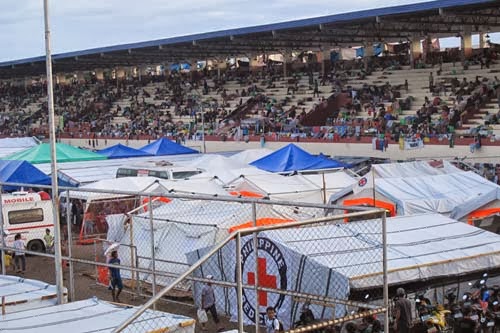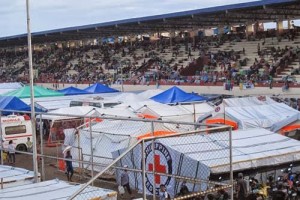
While continuing to distribute food rations to nearly 9,900 displaced people and essential relief items to as many as 50,600 in various evacuation centres, the ICRC and the Philippine Red Cross are further adjusting their services to meet the needs of people facing prolonged displacement.
“These people have been exposed to violence. Now they are living under difficult conditions in evacuation centres. That adds up to a lot of stress, especially for vulnerable and elderly people,” said ICRC doctor Luca Falqui. “In addition, we need to provide safe water, decent sanitation and a disease monitoring system to prevent the outbreak of disease.”
Annalyn Birong, a 21-year-old pregnant mother of four children who has been displaced since 9 September was kept in the observation area of the basic health-care unit supported by the Philippine Red Cross and the ICRC to rest and recover. “I’m worried about the health of my children, as I don’t know how long we’ll have to continue to live like this.”
Over the past few days, the Philippine Red Cross has been working with ICRC support to improve sanitation, basic health-care services and overall living conditions for the displaced by the following:
Setting up a six-tent basic health-care unit in the Joaquin F. Enriquez Memorial Sports Complex, manned 24 hours a day, every day, by doctors and nurses from the Philippine Red Cross, the Philippine Department of Health, and the City Health Office of Zamboanga. The medical staff are involved in the triage of patients, medical screenings and assessments, outpatient services, observation areas and maternity and child care.
Since the start of the conflict, over 7,000 people have received basic health care; launching a mass immunization campaign that includes administration of vitamin A, de-worming and nutrition assessment.To date, 438 children under the age of 15 have been treated; arranging for the immediate transfer to hospital of 146 patients in serious condition through the Philippine Red Cross ambulance service; having about 200 emergency latrines installed by 30 evacuees paid through a cash-for-work scheme; launching a clean-up campaign involving 139 evacuees and the construction of a temporary day-care centre by 12 evacuees paid through a cash-for-work scheme.
Meanwhile, ICRC staff, including two doctors, have visited and registered 230 people detained by the authorities in Zamboanga in connection with the conflict.
They have monitored the conditions in which the detainees are being held and the treatment they receive. In addition, the detainees have had a medical screening and received clothes, slippers, soap, shampoo and toothpaste. Food and medical supplies for the detainees were given to the detaining authorities.

